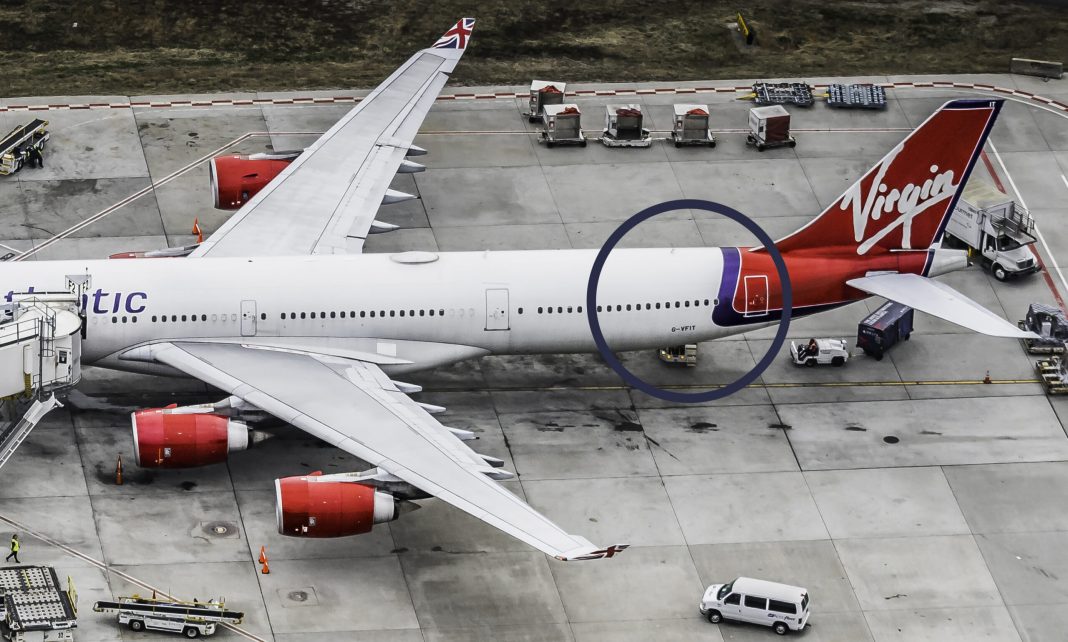The Airbus A340 has several features that render it an instantly recognizable aircraft. For example, it is a rarity in being a four-engine widebody airliner with only one passenger deck. This places it in contrast to the double-decker Boeing 747 and Airbus A380 ‘superjumbo.’ Furthermore, the A340-600 variant is strikingly long and thin in its design, to an almost disproportionate extent. However, there is another feature that sets it apart, namely its upwards-sloping rear windows. But what is the reason for this design quirk?

A long-discussed design aspect
The Airbus A340 was launched commercially by Lufthansa in March 1993, and 2021 will mark the 30th anniversary of the type’s first test flight. Admittedly, the discussion concerning its upwards-sloping rear windows hasn’t been raging on for quite so long. Nonetheless, this aspect has still been a topic of online discussion forums for several years.
A quick search reveals that users on Airliners.net, for example, were pondering the reason for the sloped windows as early as 2009. More recently, September 2020 also saw the topic discussed in greater detail on Quora.
Not exclusive to the A340
The sloped rear windows are, in fact, a feature that can be found on more Airbus aircraft than just the A340. Indeed, Airliners.net user ‘bohica’ states that it is an aspect commonly found among Airbus widebodies. Furthermore, the Quora thread title discussing the topic acknowledges that this curious slope is present on the A300, A310, A330, and A340.

Reasons for the slope
There are practical reasons why the A340’s rear windows and fuselage floor slope upwards towards its tail. Airliners.net user ‘bohica,’ for example, states that the slope is “only one degree, but it is noticeable.” It apparently reflects Airbus’s desire “to maintain cargo space” below the cabin. User ‘United1’ backs this point up. They state that the design quirk results from “the positioning of the cargo/baggage containers in the hold.”
On Quora, Airbus A320/321 pilot Anas Maaz details further the fact that the raised cabin floor functions like a ramp. This, in turn, “[accommodates] for more ULDs (Unit Load Devices), which [increases] the cargo capacity of the aircraft.”
Particularly in the current aviation climate, where more and more passenger aircraft are being used as ‘preighters,’ this is a handy feature. Maaz adds that the feature also “[reduced] design cost, and most importantly it gave the aircraft an increased cabin space.” This was because the slope meant that “the entire passenger cabin floor did not have to be raised.”

The Airbus A340 is also well known among avgeeks for its long and shallow takeoff runs. As such, Quora user and commercial pilot Eric Larsen states that this is also a factor in the type’s sloped rear fuselage design. As such, “the aircraft shape is made to reduce the possibility of an expensive tail scrape.” Larsen also adds that there are aerodynamic advantages to the design. This is because it produces less drag than a conventionally-shaped fuselage.
All in all, the Airbus A340’s numerous design quirks render it to be a particularly iconic airliner. However, its future is uncertain. Production ceased in 2011, and the drop in passenger demand caused by the ongoing coronavirus pandemic has caused increasing retirements among the type. Here’s to hoping we can continue to see its sloped rear fuselage in the skies for many years to come.
[ad_2]
Source link


